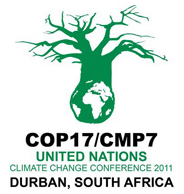 As a follow up to the 2-part series from NPR (covered here recently on 2nd Green Revolution) comes this post about various countries’ climate policy. With the end of the United Nations’ most recent conference on climate change in Durban, South Africa, NPR had a valuable synopsis of what many of the largest emitters of greenhouses are doing to reduce their emissions over the coming decades.
As a follow up to the 2-part series from NPR (covered here recently on 2nd Green Revolution) comes this post about various countries’ climate policy. With the end of the United Nations’ most recent conference on climate change in Durban, South Africa, NPR had a valuable synopsis of what many of the largest emitters of greenhouses are doing to reduce their emissions over the coming decades.
One of the biggest challenges to a unified approaches revolves around how to reconcile industrialized countries with those that are still developing.
Included in the story are the following nations as well as the European Union, along with a brief note about their plans. All data comes from the NPR report:
Australia: Reduce greenhouse gas emissions by 5 percent below 2000 levels by 2020.
Brazil: Emissions to 1994 levels and cut deforestation by 80 percent from highs by 2020.
Canada: Original commitment – reduce greenhouse gas emissions by 6 percent below 1990 levels. Current position – reduce emissions by 17 percent from 2005 levels by 2020.
China: No pledge to reduce its carbon emissions. Promised to become at least 40 percent more energy efficient by 2015.
European Union*: Reduce emissions by 20 percent below 1990 levels by 2020.
India: No pledge to reduce its carbon emissions. Agreed to increase its energy efficiency by 20 percent by 2015.
Indonesia: Pledged to cut emissions by 26 percent by 2020 from today’s levels.
Japan: Pledged to reduce its emissions by 25 percent below 1990 levels by 2020.
Russia: Pledged to reduce its emissions by at least 15 percent from 1990 levels.
South Africa: Aims for emissions to top out at levels 34 percent lower than if the country were to take no actions by 2020.
United States of America: Pledged to reduce emissions by 17 percent by 2020, which was contingent on Congress passing an aggressive cap-and-trade bill that did not pass
*Will increase to 30 percent if other developed countries sign up for similar commitments
[Image source]

